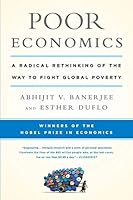
## Metadata
- Author: [[Abhijit Banerjee, Esther Duflo]]
- Full Title: Poor Economics
- Category: #books
## Highlights
- The poor often resist the wonderful plans we think up for them because they do not share our faith that those plans work, or work as well as we claim. This is one of the running themes in this book. ([Location 791](https://readwise.io/to_kindle?action=open&asin=B007CI81IQ&location=791))
- The poor seem to be trapped by the same kinds of problems that afflict the rest of us—lack of information, weak beliefs, and procrastination among them. It is true that we who are not poor are somewhat better educated and informed, but the difference is small because, in the end, we actually know very little, and almost surely less than we imagine. ([Location 1355](https://readwise.io/to_kindle?action=open&asin=B007CI81IQ&location=1355))
- we rarely need to draw upon our limited endowment of self-control and decisiveness, while the poor are constantly being required to do so. ([Location 1364](https://readwise.io/to_kindle?action=open&asin=B007CI81IQ&location=1364))
- We should recognize that no one is wise, patient, or knowledgeable enough to be fully responsible for making the right decisions for his or her own health. ([Location 1365](https://readwise.io/to_kindle?action=open&asin=B007CI81IQ&location=1365))
- Because regulating who sets up a practice and decides to call himself a doctor seems to be beyond the control of most governments in developing countries, the only way to reduce the spread of antibiotic resistance and the overuse of high-potency drugs may be to put maximal effort into controlling the sale of these drugs. All this sounds paternalistic, and in a way, it certainly is. But then it is easy, too easy, to sermonize about the dangers of paternalism and the need to take responsibility for our own lives, from the comfort of our couch in our safe and sanitary home. Aren’t we, those who live in the rich world, the constant beneficiaries of a paternalism now so thoroughly embedded into the system that we hardly notice it? It not only ensures that we take care of ourselves better than we would if we had to be on top of every decision, but also, by freeing us from having to think about these issues, it gives us the mental space we need to focus on the rest of our lives.This does not absolve us of the responsibility of educating people about public health. We do owe everyone, the poor included, as clear an explanation as possible of why immunization is important and why they have to complete their course of antibiotics. But we should recognize—indeed assume—that information alone will not do the trick. This is just how things are, for the poor, as for us. ([Location 1378](https://readwise.io/to_kindle?action=open&asin=B007CI81IQ&location=1378))